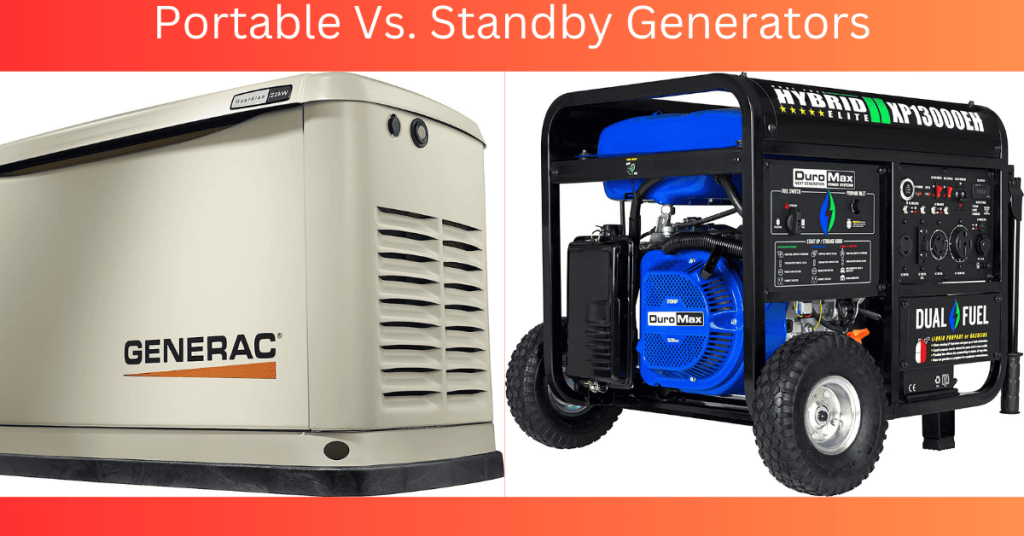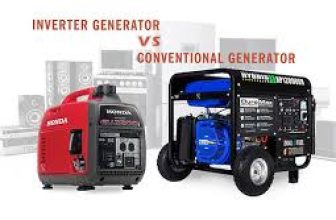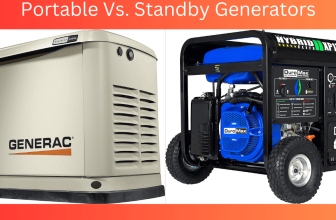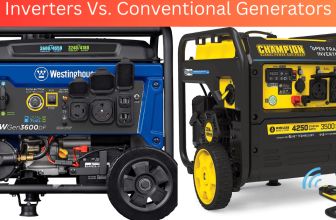Are you one of those people who like to be prepared for anything? Do you want to be sure that your home will never be without power, even if there is an outage in your area? If you are, then you are probably considering buying a generator. But which one is right for you: portable or standby?
In this article, we will answer all your questions about portable vs. standby generators. We will explain the differences, the advantages and disadvantages of each, and help you choose the right generator for your needs. By the time you finish reading this article, you will have a clear understanding of what each type of generator can do for you, and which one is the best choice for your home.
So, let’s get started!
Key Takeaways
- Standby generators provide a more powerful and seamless backup power option for the entire home, but come at a higher cost and require professional installation.
- Portable generators are smaller and more easily movable, but can only power a few appliances for a few hours or up to a day.
- Standby generators use natural gas or propane, while portable generators run on gasoline, propane, or diesel fuel.
- Regular maintenance is necessary for both types of generators, and fuel costs should also be taken into account when considering maintenance expenses.

Understanding the Differences Between Portable and Standby Generators
So, if you’re trying to decide between a portable or standby generator, it’s important to understand the differences between the two.
Portable generators are smaller and typically have wheels, making them easy to move from one location to another. They run on gasoline, propane, or diesel fuel, and can provide power for a few hours or up to a day.
Standby generators, on the other hand, are permanently installed outside of your home and are connected directly to your electrical system. They are powered by natural gas or propane and can provide power for days or even weeks.
One of the main differences between portable and standby generators is the amount of power they can provide. Portable generators are typically smaller and can only power a few appliances at a time, while standby generators are larger and can power your entire home.
Another difference is the level of convenience. Portable generators require manual setup and fueling, while standby generators are automatic and start up within seconds of a power outage.
While portable generators have their advantages, such as their affordability and mobility, they may not be the best option for everyone. Standby generators offer a more seamless and convenient backup power option, especially for those who live in areas with frequent power outages or have medical equipment that requires constant power.
In the next section, we’ll dive into the advantages of portable generators, but it’s important to weigh the differences between the two before making a decision.
Advantages of Portable Generators
One major benefit of using a portable generator is that it can power a variety of appliances during a power outage, including refrigerators, lights, and electronics, increasing your comfort and safety during an emergency. This means that you can still keep your food fresh, have lighting to navigate through the dark, and stay connected to the outside world.
Additionally, portable generators are easy to move around which means that you can take them with you wherever you go. This is especially useful if you enjoy camping or spending time in the great outdoors.
Another advantage of portable generators is that they’re generally less expensive than their standby counterparts. This means that you can get the power you need without breaking the bank. Furthermore, portable generators are often more fuel efficient than standby generators, which means that you can run them for longer periods of time without having to refuel. This is especially important during extended power outages.
Lastly, portable generators are generally easier to maintain than standby generators. This is because they’re smaller and simpler in design, which means that they require less maintenance over time. Additionally, if something does go wrong with your portable generator, it’s often easier to find replacement parts and get it repaired quickly. This means that you can get back to using your generator as soon as possible.
However, there are some downsides to using portable generators that we’ll discuss in the next section.
Disadvantages of Portable Generators
If you’re looking for a reliable source of backup power during an outage, it’s important to consider the potential drawbacks of using a portable generator. While these generators are convenient and affordable, they come with several disadvantages that you should be aware of before making a purchase.
Firstly, portable generators are not as powerful as standby generators, which means they may not be able to power all of your appliances and electronics. This can be a significant limitation if you rely on certain devices for medical reasons or if you have a large household with many people.
Additionally, portable generators require frequent refueling, which can be a hassle during extended outages.
Another disadvantage of portable generators is that they can be noisy and emit toxic fumes. This can be a problem if you live in a densely populated area or if you have neighbors who are sensitive to noise or air pollution.
Furthermore, portable generators are not always safe to use indoors, which means you may need to set them up outside and run extension cords into your home, which can be inconvenient and potentially hazardous.
Despite these drawbacks, portable generators can still be a practical option for many homeowners, especially those who only need backup power for a short period of time. However, if you’re looking for a more powerful and reliable source of backup power, you may want to consider investing in a standby generator instead.
With that in mind, let’s take a look at the advantages of standby generators.
Advantages of Standby Generators
A standby generator provides a seamless and reliable source of backup power for your home, automatically switching on within seconds of a power outage. Here are some advantages of having a standby generator installed at your home:
- Increased Convenience: With a standby generator, you don’t have to worry about manually starting it up during a power outage. It automatically starts up and switches off when the power comes back on. This means you can continue with your daily activities without any interruption.
- Increased Safety: With a standby generator, you don’t have to worry about the dangers of carbon monoxide poisoning from running a generator indoors. It’s installed outside your home and runs on natural gas or propane.
- Increased Home Value: Installing a standby generator can increase the value of your home, making it a worthwhile investment. It can also be a selling point when you decide to sell your home in the future.
While standby generators provide a host of benefits, there are also some disadvantages to consider. Let’s take a look at some of the drawbacks of having a standby generator installed at your home.
Disadvantages of Standby Generators
So, let’s talk about the disadvantages of standby generators.
First off, they come with a higher cost than portable generators, primarily due to their larger size and capacity.
Additionally, professional installation is required for standby generators, which adds to the overall cost.
And finally, maintenance and fuel costs can also be higher for standby generators as they require routine maintenance and a constant supply of fuel.
Higher Cost
The higher cost of standby generators can be justified by their ability to automatically turn on and off. A 2019 report found that 85% of homeowners who purchased standby generators felt it was a worthwhile investment for their home’s safety and convenience.
While portable generators are cheaper, they require manual setup and fueling, and must be monitored constantly to prevent carbon monoxide poisoning or other hazards. Standby generators, on the other hand, can provide uninterrupted power for days or even weeks, making them ideal for areas with frequent power outages or severe weather conditions.
Despite the higher upfront cost, standby generators can save homeowners money in the long run by preventing costly damage to appliances or electronics during power surges or outages. They can also provide peace of mind knowing that your home will remain powered in the event of an emergency. However, it’s important to note that professional installation is required for standby generators, and this can add to the overall cost.
In the next section, we’ll discuss why professional installation is necessary and what it entails.
Professional Installation Required
Installing a standby generator isn’t a DIY project. Professional installation is required to ensure safe and proper operation. A licensed electrician or generator dealer should install the standby generator, as they have the necessary training and experience to properly connect the generator to your home’s electrical system.
In addition, local building codes and zoning regulations may require permits and inspections for the installation of standby generators.
Professional installation may require additional costs, but it’s necessary to ensure that the generator is properly installed and ready to use in the event of a power outage. It’s important to consider the long-term benefits of having a standby generator installed by a professional, such as the peace of mind that comes with knowing that your home will have power during an outage.
Additionally, professional installation ensures that the generator will operate safely and efficiently, which can save on maintenance and fuel costs in the long run.
Maintenance and Fuel Costs
Maintaining a standby generator is like tending to a garden – regular care and attention are necessary to ensure it runs smoothly and efficiently. This involves regular oil changes, filter replacements, and battery checks to ensure the generator is ready to go when you need it most. It’s important to read the manufacturer’s manual and follow the recommended maintenance schedule to avoid any potential problems down the line.
When it comes to fuel costs, standby generators can be more expensive to operate than portable generators. Standby generators run on natural gas or propane, which can be costly to purchase and install. However, standby generators typically have a longer lifespan than portable generators, which can make them a more cost-effective option in the long run.
When considering the maintenance and fuel costs of a standby generator, it’s important to weigh the benefits of having a reliable power source during an outage against the initial investment and ongoing expenses.
Transitioning into the next section, it’s important to consider your specific needs when choosing the right generator. Factors like the size of your home, the number of appliances you need to power, and the duration of potential outages should all be taken into account.
Choosing the Right Generator for Your Needs
Deciding on the perfect generator to fit your needs can feel overwhelming, but with a little research and understanding of what you’ll be using it for, the options will become much clearer.
Here are some factors to consider when choosing a generator:
- Power output: The amount of power you need will depend on the appliances and devices you plan to run during an outage. Make a list of the essential items you’ll need to power, and add up their wattage requirements. This will give you a good starting point for determining the size of the generator you need.
- Fuel type: Generators can run on a variety of fuels, including gasoline, propane, and diesel. Consider which fuel is most readily available in your area, as well as the cost and storage requirements. Propane is a popular choice for standby generators, as it can be stored indefinitely and is less flammable than gasoline.
- Portability: If you need a generator for outdoor activities like camping or tailgating, portability will be a key factor. Look for a generator that is lightweight and easy to carry, with a handle or wheels for transport. Standby generators, on the other hand, are designed to be permanently installed and are not meant to be moved around.
By taking these factors into account, you can choose a generator that meets your specific needs and budget. Keep in mind that a generator is an investment in your peace of mind during power outages, so it’s worth taking the time to make an informed decision. With the right generator, you’ll be able to weather any storm with confidence.
Frequently Asked Questions
Can a portable generator be used indoors?
No, it is not safe to use a portable generator indoors due to the risk of carbon monoxide poisoning. Always use portable generators outside in a well-ventilated area to ensure your safety and the safety of others.
How long do standby generators typically last?
Standby generators can last up to 20-30 years with proper maintenance. This includes regular inspections, oil changes, and battery replacements. It’s important to choose a reliable brand and have it installed by a licensed professional.
Is it safe to run a portable generator in the rain?
Yes, it’s safe to run a portable generator in light rain with proper precautions. Keep it on a dry surface, cover it with a canopy or umbrella, and plug in appliances with extension cords that have built-in ground fault circuit interrupters (GFCI).
Can a standby generator power an entire house?
Yes, a standby generator can power an entire house. It automatically switches on during a power outage and can provide enough electricity to run appliances and lights. We recommend consulting a professional for installation and maintenance.
What is the average cost to install a standby generator?
You might think a standby generator is expensive, but it’s worth it. On average, it costs between $5,000-$15,000 to install one, depending on the size and complexity of your home. But it’s a small price to pay for peace of mind during power outages.
Conclusion
So, which generator is right for you? It all depends on your specific needs and preferences. If you’re looking for a generator that can be easily moved around and used for various purposes, a portable generator may be the way to go.
However, if you want a reliable source of backup power that can automatically turn on when the electricity goes out, a standby generator is the better choice.
Think of it like choosing between a bicycle and a car. Both can get you from point A to point B, but one is more convenient for short trips and the other provides a reliable mode of transportation in case of emergencies.
Ultimately, the decision is up to you and what you prioritize in a generator. Just make sure to do your research and choose a reputable brand to ensure your investment is worth it in the long run.





